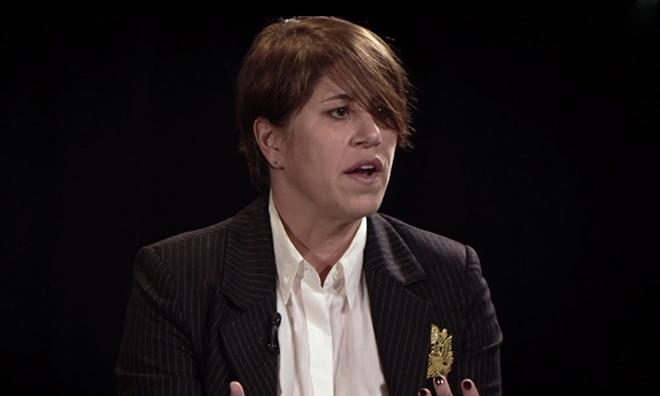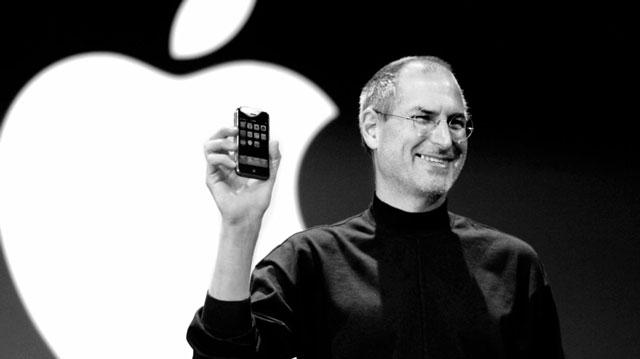In an interview from September, former Apple marketing vice president Allison Johnson discusses working in an environment where the words "branding" and "marketing" were frowned upon, especially by company cofounder Steve Jobs.
In the interview from Behance's 99U conference, first spotted by Cult of Mac, Johnson described her time at Apple during a phase in which the company became what she calls a "launch machine."
Johnson worked at Apple from 2005 to 2011, meaning she was part of two major product launches in the iPhone and iPad, devices that would go on to revolutionize the mobile computing world and solidify Apple's place as a segment pioneer.
A major component of Apple's success was the tenet of informing consumers, not selling to them. Instead of being in a "selling mode," companies should focus on educating consumers on what a device does, why it exists and how it can improve their lives, Johnson says. In fact, she differentiates the two, saying marketing is not the same as selling. This idea of teaching rather than selling speaks to Apple's mantra of making the best possible products, which in turn will sell themselves.
Also touched upon was Apple's approach to launching finished products rather than "beta hardware" like Google Glass. Comparing the two techniques, Johnson appreciates the Google method of gathering information from user experience, but said "Apple wouldn't do that. Never, ever, ever."
To that point, Johnson described Jobs' insistence on secrecy. A final product would only be unveiled when it was ready for consumers, and the job of announcing that product on stage always fell to Jobs.
"It was just something he really, really enjoyed — he was passionate about," Johnson said, adding that the veiled secrecy method is something only Apple can pull off.
We could just put things on the website and the world would blow up automatically. Everybody would be talking about it, reading about, writing about it. It was a really interesting and important technique. It's unique to Apple. I don't think a lot of companies can operate that way."
Johnson also shared a few anecdotes about Jobs, including two instances where he was seen crying over the trials and tribulations of running a company with which he was so deeply entwined.
The first was an ad campaign surrounding the release of The Beatles on iTunes, a band which Jobs loved but had difficulties bringing to the music store due in part to a legal spat regarding the "Apple" trademark (The Beatles founded "Apple Records" as a division of the band's Apple Corps project). According to Johnson, the project was extremely important to Jobs.
A team from Apple visited London to pick up more than a thousand never-before-seen photographs of The Beatles to be used as part of the ad campaign. When the pictures were finally brought back and spread out on a boardroom table, Jobs perused the collection in tears knowing he had finally accomplished a longtime goal.
A second story focused on the impact negative publicity had on the late Apple cofounder.
"He was so sad and so angry about the "antennagate" issue and how that was getting portrayed," Johnson said. "His core leadership team — product and marketing leadership team — were sitting around the table, and he was pounding the table and said, 'This is not the company I want to be. This is not what we are building, we don't want to be that company, we don't want people to think about us this way."
Where the Beatles milestone brought tears, "antennagate" caused sobbing.
"Did he deeply care about that company and was it one and the same as him? Without question," she said.
 Mikey Campbell
Mikey Campbell








-m.jpg)






 Malcolm Owen
Malcolm Owen
 Amber Neely
Amber Neely


 Christine McKee
Christine McKee

 Chip Loder
Chip Loder
 Marko Zivkovic
Marko Zivkovic









80 Comments
I've been informed that it was all luck. :\
Hrmmph... Lest anyone forget, Steve Jobs hated marketing people.
I hate to be the one to state the obvious, but that is selling the product. You can word it anyway you want, but it's still s spade.
i
I hate to be the one to state the obvious, but that is selling the product.
Disagree. You can educate and be persuasive without directly asking for a purchase.
i
I hate to be the one to state the obvious, but that is selling the product.
Disagree. You can educate and be persuasive without directly asking for a purchase.
Yeah. Steve said it was not selling, but rather, telling people about the features and benefits of the product.